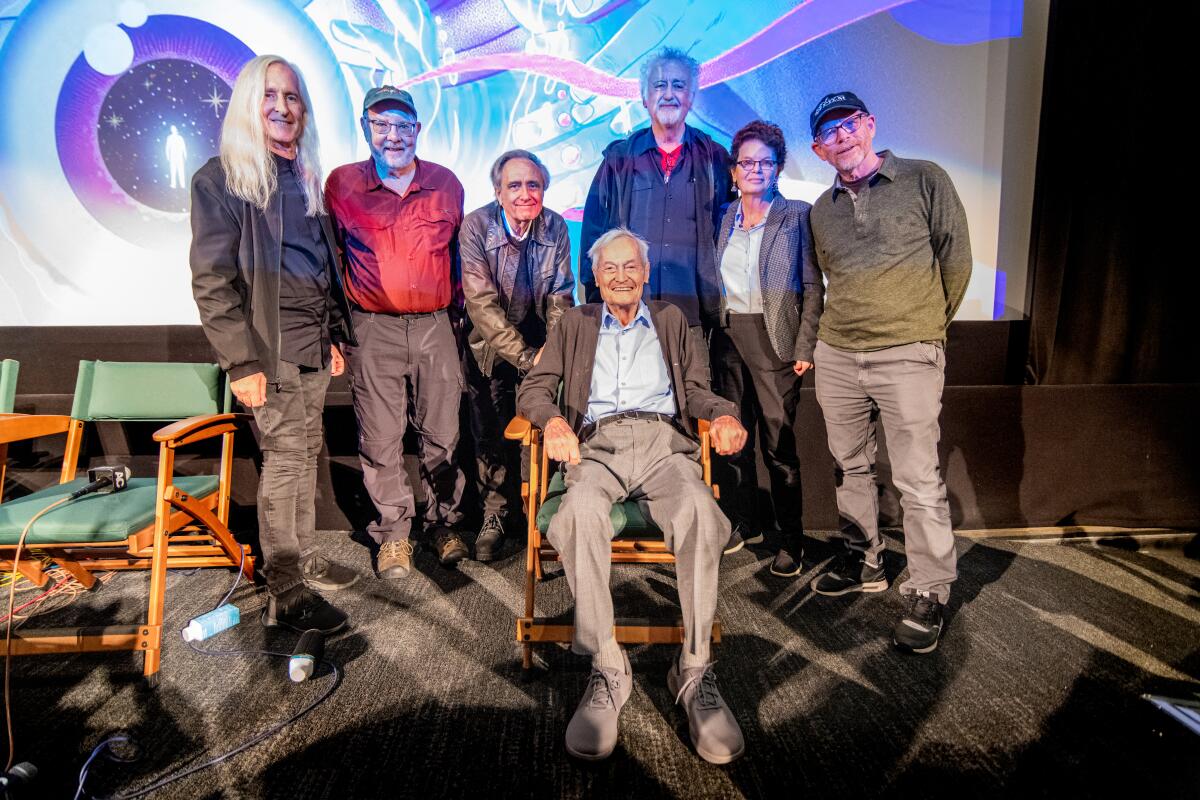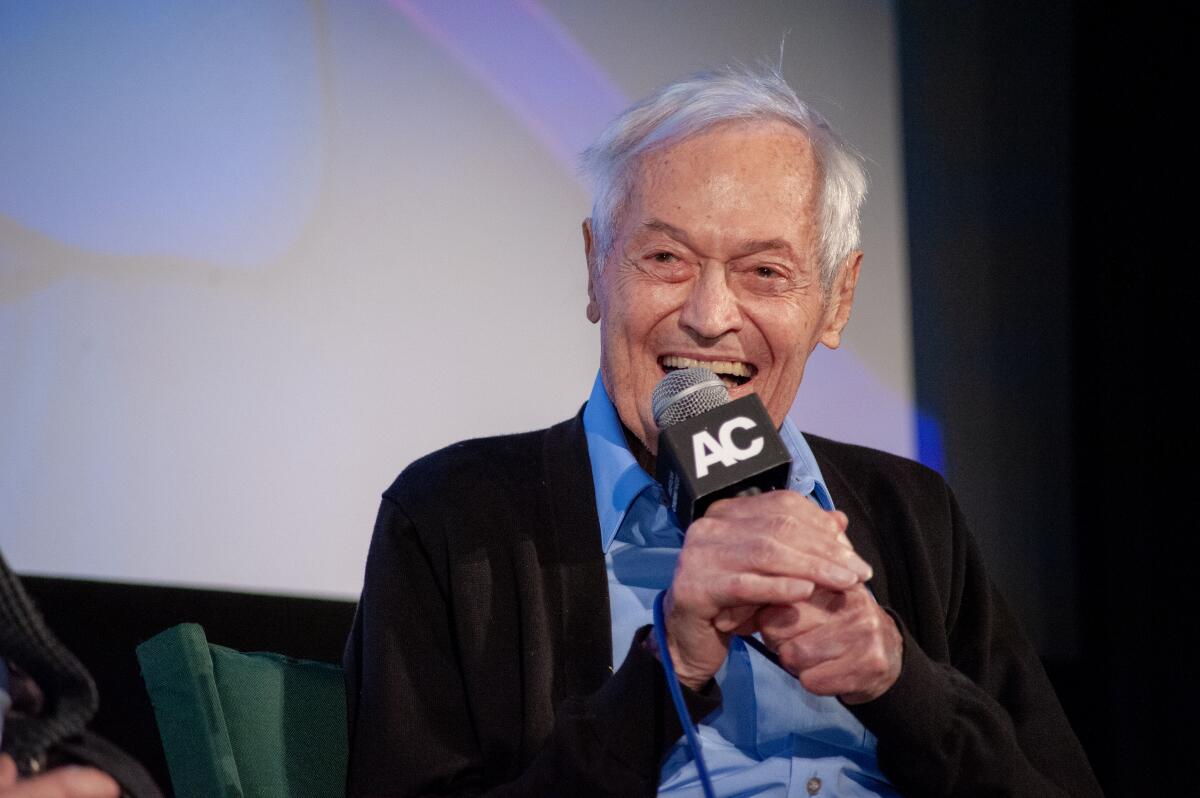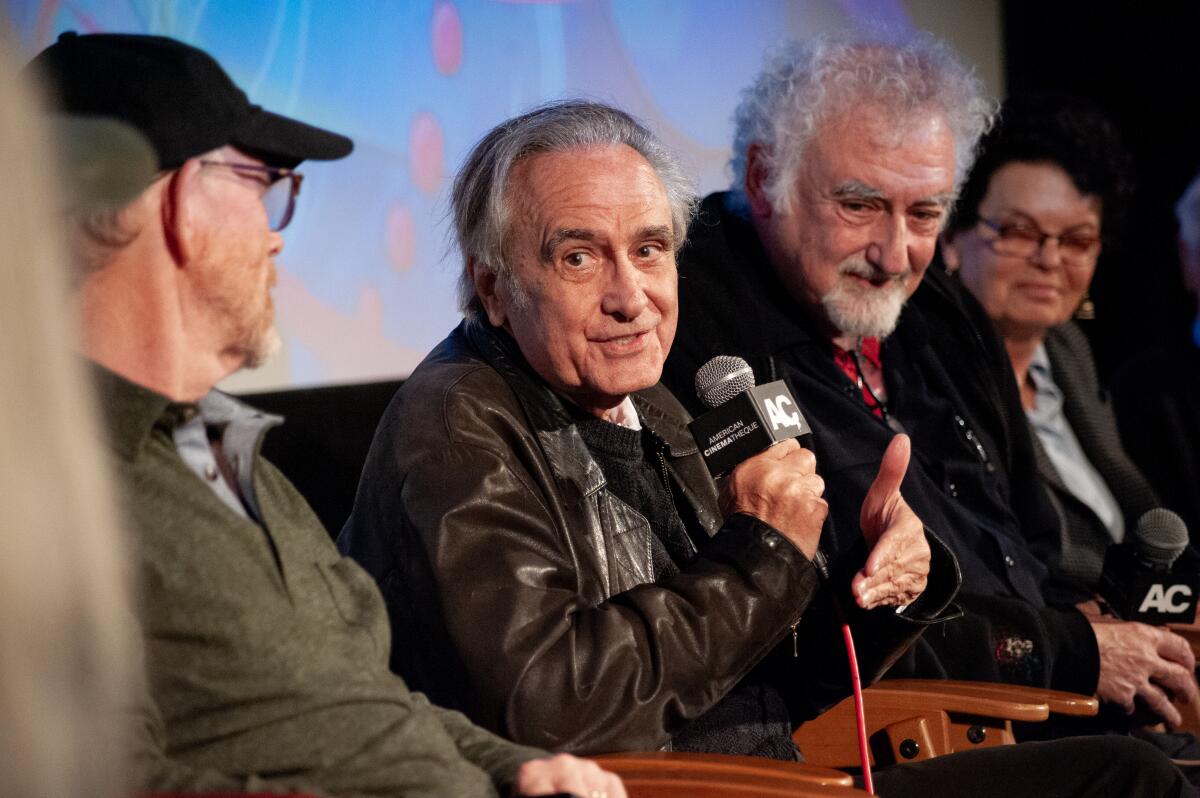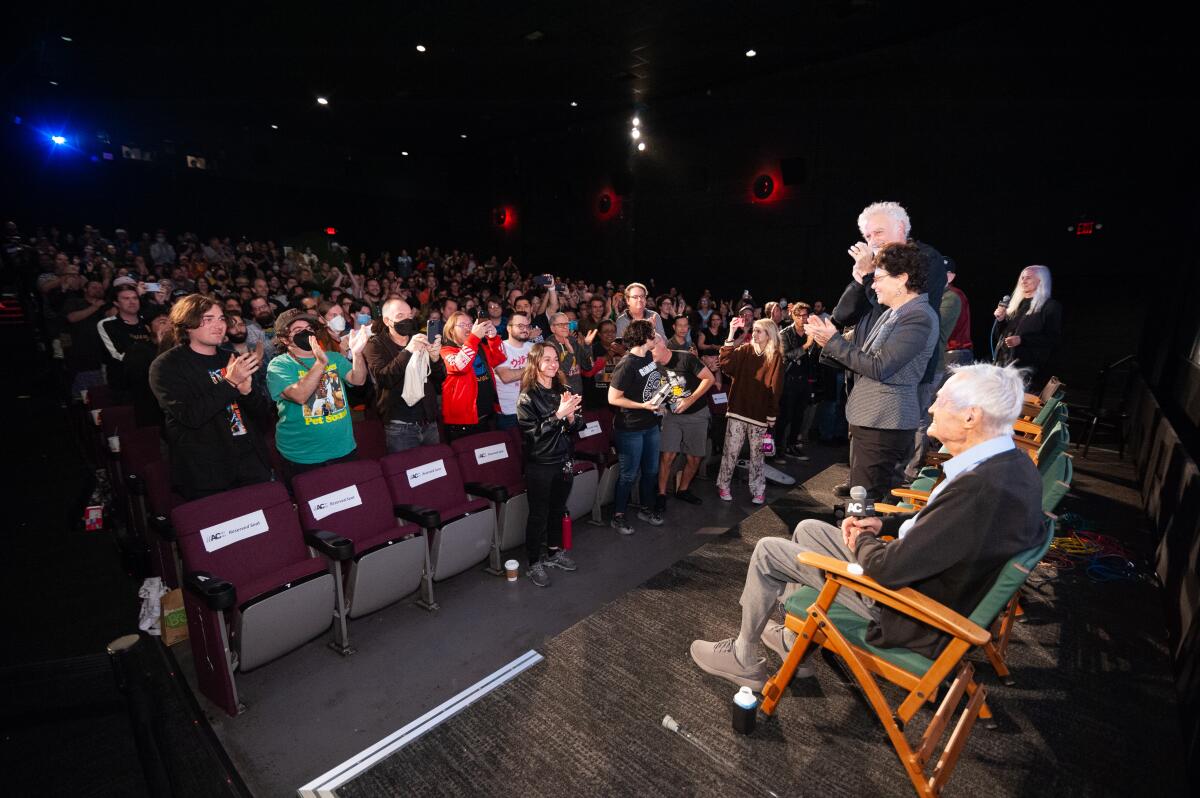Roger Corman saluted by fans at Beyond Fest: âSimply, I love making motion picturesâ

Beyond Fest and the American Cinematheque saluted producer Roger Corman on Saturday with a four-film marathon followed by a conversation with some of the directors who began their careers working for the now-legendary genre icon.
Speaking to The Times just moments before he stepped onstage at the Aero Theatre for an extended standing ovation, the 97-year-old Corman looked back on some of the changes to the film industry heâd seen during a career that stretches back to the mid-1950s.
âI think the great heads of studios in the past understood that motion pictures are an art form and a business, and you have to understand both of those things,â said Corman, sitting in the back seat of a car parked behind the theater. âI think one of the problems today is that the new heads of studios understand only the business, and they donât understand that this is also an art form.â
Though he began his career as a screenwriter and director, it was as a producer that Corman made his biggest impact, in particular through the company he co-founded in 1970 with his brother Gene, New World Pictures. Among those who worked with Corman early in their careers were Jack Nicholson, Martin Scorsese, James Cameron, Francis Ford Coppola, Jonathan Demme, Carl Franklin, Peter Bogdanovich and many more. Though he is known for movies made quickly and cheaply for drive-ins and double-bills, Corman also distributed major international art-house films by the likes of Akira Kurosawa, Ingmar Bergman, François Truffaut and Federico Fellini.

The Beyond Fest tribute began with director Allan Arkush introducing a screening of âRock ânâ Roll High School,â followed by Ron Howard introducing âGrand Theft Auto,â then showings of Joe Danteâs âPiranhaâ and the Corman-directed âThe Raven.â Howard returned to the theater later in the day on his bicycle to join Arkush, Dante, âSlumber Party Massacreâ director Amy Holden Jones, âHollywood Boulevardâ producer Jon Davison and Corman himself for a lively, affectionate conversation moderated by filmmaker Mick Garris.
âItâs impossible to discuss the most influential filmmakers of all time without including the great Roger Corman,â Christian Parkes, founder of Beyond Fest, said in a statement. âThe definitive trailblazer and pioneer of independent film, his mark on cinema is indelible, his impact unparalleled, and legacy is forever enduring. Beyond Fest wouldnât exist without him.â
Before the start of the panel, two surprise tribute videos were played. âTĂĄrâ filmmaker Todd Field, who acted in three films for Corman early in his career, celebrated his âamazing, unparalleled impact on so many in the industry.â Field also recounted how, at a test screening of Carl Franklinâs âFull Fathom Five,â Corman declined anything from the concession stand before the movie while Field got a large tub of popcorn. At some point during the movie, Field noticed Cormanâs hand sneaking popcorn from his tub.
âAnd I thought, smart guy,â said Field. âThis is why youâre Roger Corman.â
John Sayles, a two-time Academy Award nominee, wrote screenplays for Corman before launching his own career as a director. In a video, he thanked Corman for âsending me through film school and paying me at the same time.â
The filmmakers on stage had collaborated together in various configurations while working for Corman, so there was a collegial, affectionate air of a class reunion to the event. All shared outrageous stories of test screening their Corman-produced movies, from Howard screening his youth car-chase picture âGrand Theft Autoâ to an audience of elderly people, and Dante recalling showing âI Never Promised You a Rose Gardenâ for mental patients from Cedars-Sinai.

Among the warm anecdotes and friendly memories, things repeatedly circled back to the same idea that Corman had always expressed â that his own experiences as a filmmaker made him an exceptional producer and studio chief.
Jones recalled how Corman suggested changing the title of a script called âSleepless Nightsâ to âSlumber Party Massacre.â
âThat was a smart move,â she added, noting that having established a successful career as a film editor, she turned down a job on âE.T.â for the opportunity to direct her own feature.
âThe vast majority of people canât tell good from bad,â said Jones. âYou get notes on cuts that donât particularly make sense, to get reshoots that arenât fixing whatâs actually the problem. But mainly the executives canât tell good from bad. And Roger knew it immediately.â
âIâll never be working for anybody again who knows as much about movies as Roger did when I was starting out,â said Dante, who went on to make the âGremlinsâ movies. âUnfortunately, the problem is that the more movies you make, and the more executives you meet, the more you realize that there are almost none who know as much about movies as you do. And so they are no help.
âIn fact, theyâre a hindrance and you spend a lot of time trying to please people who donât know what they want,â added Dante. âAnd if they did, they wouldnât know how to express it anyway. So I think all of us feel that the best years of our creative lives were spent working for somebody who knew more than we did. And that was Roger.â
Arkush pointed to Corman when he said, âThe profound thing is, this is the only person to run a studio who knows how to make a movie.â
Howard noted how after his successful career as a young actor, no one would take seriously his desire to direct and Corman was the first person who didnât patronize him over the idea, agreeing to let Howard direct second-unit if he would star in âEat My Dust!â After that movie was a success, Howard went in to pitch Corman on other ideas, including noirs, thrillers and sci-fi.
âFinally, Roger said, âWell, those are all very interesting. But Iâm very interested in young people on-the-run and car-crash pictures,ââ recalled Howard. Corman told him if he could write a script with the title âGrand Theft Auto,â he could make that movie.
âIt wound up being the fastest green light that I ever got in Hollywood,â said Howard, a future two-time Oscar winner.
Jones recalled that Corman told her a script needed to have either humor, sex or violence to be entertaining to an audience.
âAnd that changed my entire career,â she said. âAll of a sudden I thought, This is a mass medium and we are here to entertain. And I never made anything again that didnât have at least one of those three elements. And it makes me a little impatient with many Oscar nominees to this day lately, because they donât necessarily entertain me. I want to be entertained and moved. And thatâs, I think, the most important thing Roger taught me.â
âHe gives you a tremendous amount of freedom,â Dante said of his mentor. âIf you can explain to him why thereâs an upside-down shot in the movie, and he buys it, he lets you have an upside-down shot in the movie. For all of us, the trick was: If youâre going to make a women-in-cages movie, youâve got to make the best women-in-cages movie that you can possibly make. And when you look at the New World pictures against the competition, theyâre all better.â
Howard echoed those comments, saying, âWhile budget was always a concern, in all honesty, quality was always the conversation. How do you gain whatâs essential in the scene and make it good, but do it in a timely, responsible way?
âAnd as a young director coming in, it was about diagramming, it was about organizing, it was about prep,â continued Howard. âIt was about all these things so that the elements that are going to matter to an audience are actually as well executed as they can be.â
Dante recalled that when Howard asked for additional extras for a crowd scene, Cormanâs response was, âRon, Iâm not going to give you more extras, but if you do this picture correctly, youâll never have to work for me again.â

Corman summed up his filmmaking ethos as one point by noting, âNo matter what happens, keep shooting.â
A lifelong outsider to the Hollywood studios, Corman did tell The Times that there have been moments when he felt accepted.
âWhen I got my Academy Award, I thought that was acceptance,â said Corman, who received an honorary Oscar at the first Governors Awards ceremony in 2009. âAnd the star on the Hollywood Boulevard Walk of Fame, I thought they were accepting me.â
Corman mentioned two of the films he directed, 1964âs âThe Masque of the Red Deathâ and 1962âs âThe Intruderâ as personal favorites among his long career.
As for what has kept him going all this time, his answer had the same wise economy as his movies.
âSimply, I love making motion pictures,â said Corman. âItâs a continually challenging experience. Every film represents a problem in one way or another.â
More to Read
Only good movies
Get the Indie Focus newsletter, Mark Olsen's weekly guide to the world of cinema.
You may occasionally receive promotional content from the Los Angeles Times.











